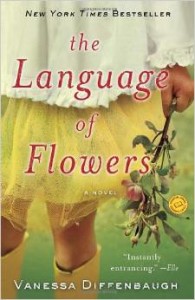When my book club chose this as our March selection, I was worried that it would be overly twee—I just knew it had something to do with the Victorian language of flowers and a damaged young woman. Luckily, this first novel by Vanessa Diffenbaugh is a bit grittier (even though there is a small bit of magical realism) and I found it quite engaging.
The novel alternates between two stories: what happens when Victoria Jones turns 18, leaves the group home she’s been living in as well as the foster care system, and attempts to make her way in the world and the story of what happens to nine-year-old Victoria when, after getting tossed out of foster placement after foster placement, she finally finds a situation and a foster mother that just might work out. Of course, the reader knows that it didn’t work out but what causes Victoria’s life with Elizabeth, the foster mother who seems to understand, deal with, and even identify with Victoria’s rages and insecurities, to derail is not revealed until the end of the novel.
Meanwhile, adult Victoria struggles to find a job and a place to live but manages (rather quickly) to connect with Renata, a florist, who needs help preparing for a busy wedding season. Victoria’s love of flowers and knowledge about what they symbolize comes into play and while at the flower market with Renata, she meets a young man who seems to speak the language of flowers as well. However, because this isn’t exactly a shiny happy novel, who the young flower vendor turns out to be is someone who brings Victoria’s past crashing into her future and it seems like Victoria is doomed to repeat her mistakes. I won’t go any further than that because one of the strengths of the novel is how all this unfolds.
Another strength is how realistic Victoria is. I found myself getting so mad at her and some of the choices she makes but then I realized that part of my problem is that my framework (stable and safe childhood) is not her framework and all her decisions stem from that gaping hurt she suffered repeatedly as a kid. She doesn’t reach out for help precisely because her attempts to reach out as a kid were beaten back again and again.
Though some of the plot here clicks too neatly into place, I thought Diffenbaugh did a good job of exploring the prickly complexities of Victoria and weaving a lot of interesting plant/flower information into the story. I’m looking forward to discussing this with my “Badass Book Club” soon.

